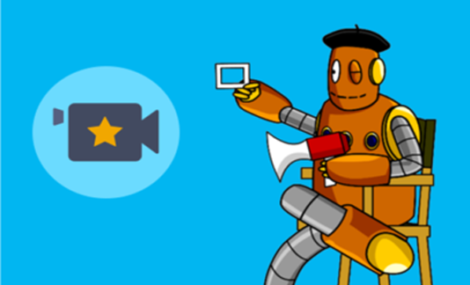Make-a-Movie Lesson Plan: Digital Citizenship

Grade Levels: 3-5, 6-8, 9-12
This lesson plan features BrainPOP’s collection of Digital Citizenship resources, and is adaptable to all topics in the collection. In this lesson, students explore digital citizenship topics, then apply what they learn by creating a BrainPOP-style movie using the Make-a-Movie tool. Finally, students present their movies to their peers and follow up with a q & a. This strategy makes it possible for all students to learn about every topic within a digital citizenship theme–the one they present and the ones their peers are presenting to them.
Lesson Plan Common Core State Standards Alignments
Grade: K, 01, 02, 03, 04, 05, 06, 07, 08, 09, 10, 11, 12
CCSS.ELA-Literacy.CCRA.R.2
Determine central ideas or themes of a text and analyze their development; summarize the key supporting details and ideas.
Grade: K, 01, 02, 03, 04, 05, 06, 07, 08, 09, 10, 11, 12
CCSS.ELA-Literacy.CCRA.R.6
Assess how point of view or purpose shapes the content and style of a text.
Grade: K, 01, 02, 03, 04, 05, 06, 07, 08, 09, 10, 11, 12
CCSS.ELA-Literacy.CCRA.R.7
Integrate and evaluate content presented in diverse media and formats, including visually and quantitatively, as well as in words.1
Grade: K, 01, 02, 03, 04, 05, 06, 07, 08, 09, 10, 11, 12
CCSS.ELA-Literacy.CCRA.SL.2
Integrate and evaluate information presented in diverse media and formats, including visually, quantitatively, and orally.
Grade: K, 01, 02, 03, 04, 05, 06, 07, 08, 09, 10, 11, 12
CCSS.ELA-Literacy.CCRA.SL.4
Present information, findings, and supporting evidence such that listeners can follow the line of reasoning and the organization, development, and style are appropriate to task, purpose, and audience.
Grade: K, 01, 02, 03, 04, 05, 06, 07, 08, 09, 10, 11, 12
CCSS.ELA-Literacy.CCRA.SL.5
Make strategic use of digital media and visual displays of data to express information and enhance understanding of presentations.
Grade: K, 01, 02, 03, 04, 05, 06, 07, 08, 09, 10, 11, 12
CCSS.ELA-Literacy.CCRA.W.2
Write informative/explanatory texts to examine and convey complex ideas and information clearly and accurately through the effective selection, organization, and analysis of content.
Grade: K, 01, 02, 03, 04, 05, 06, 07, 08, 09, 10, 11, 12
CCSS.ELA-Literacy.CCRA.W.6
Use technology, including the Internet, to produce and publish writing and to interact and collaborate with others.
Grade: K, 01, 02, 03, 04, 05, 06, 07, 08, 09, 10, 11, 12
CCSS.ELA-Literacy.CCRA.W.7
Conduct short as well as more sustained research projects based on focused questions, demonstrating understanding of the subject under investigation.
Students will:
- Explore digital citizenship topics through animations, learning games, quizzes, etc.
- Make connections between digital citizenship topics.
- Apply knowledge by creating a BrainPOP-style movie.
- Present movie to peers.
- Answer questions from peers about their presentations.
Materials:
- Computers or other devices with Internet access
- Whiteboard
- Brainstorming Web
Preparation:
Preview the Digital Citizenship topics students will explore, adapting features as needed.Lesson Procedure:
- Display a Brainstorming Web on the whiteboard. Write the title of the overarching theme students will be exploring in the center of the web (e.g., Digital Etiquette, Internet Safety, etc.). Ask students what they know about the topic. Encourage them to share whatever comes to mind. Jot down their ideas on the web.
- As a class, review terminology related to the theme. See Digital Citizenship vocabulary.
- Identify the topics that align to the theme (see What is Digital Citizenship for associated topics). For example, if the theme is Internet Safety, the BrainPOP topics include Information Privacy, Hackers, and Cyberbullying.
- Divide the class into small groups. Within a group, assign a different topic to each student so that as a group they will cover all the topics in the theme. If there are more students than topics, pair students to work together on a topic.
- Allow time for students explore the topic, including the movie, games, activities, quizzes etc. Depending on the number of features the topic offers (e.g., games, activities, etc), exploration may require several class periods (you may also assign as homework). As students learn about the topic, encourage them to keep notes on a concept map. If students are exploring a topic as a pair, you might suggest that after watching the movie together, each student reviews different features, so for example, one does the Primary Source activity while the other reads the Related Readings.
- After everyone in the group has navigated through their topic, instruct them to use the Make-a-Movie tool (accessible from within their assigned topic) to create a BrainPOP-style movie about the topic they explored. NOTE: Students must be logged into a My BrainPOP account to access the Make-a-Movie tool. Point out that they can begin their movies with one of the pre-written letters if it’s relevant or they can write their own. For students working in pairs, suggest that they divide the tasks. For example, one person might select the art while the other does the narration.
- Finally, invite each student or pair to share his or her movie with the small group. Build in time for questions and answers after each presentation.
- Bring the whole class together again, and display the Brainstorming Web from the beginning. Invite students to add ideas they learned and to correct anything that may have been incorrect during the initial brainstorm.
Extension Activities:
Challenge students to take the quiz for the topics their peers presented to assess what they learned.Related:
Filed as:
3-5, 6-8, 9-12, CCSS.ELA-Literacy.CCRA.R.2, CCSS.ELA-Literacy.CCRA.R.6, CCSS.ELA-Literacy.CCRA.R.7, CCSS.ELA-Literacy.CCRA.SL.2, CCSS.ELA-Literacy.CCRA.SL.4, CCSS.ELA-Literacy.CCRA.SL.5, CCSS.ELA-Literacy.CCRA.W.2
CCSS.ELA-Literacy.CCRA.W.6, CCSS.ELA-Literacy.CCRA.W.7, Cyberbullying, Digital Citizenship, Digital Etiquette, Email and IM, Hackers, Information Privacy, Internet, Internet Search, Lesson Plan, Make-a-Movie, Malware, Media Literacy, Online Safety, Online Sources, Social Media, Social Networking, Teacher Resources











